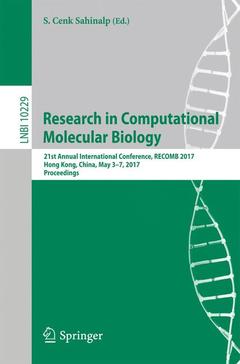Research in Computational Molecular Biology, 1st ed. 2017 21st Annual International Conference, RECOMB 2017, Hong Kong, China, May 3-7, 2017, Proceedings Lecture Notes in Bioinformatics Series
Coordonnateur : Sahinalp S. Cenk

The 22 regular papers presented in this volume were carefully reviewed and selected from 184 submissions. 16 short abstracts are included in the back matter of the volume. They report on original research in all areas of computational molecular biology and bioinformatics
Date de parution : 04-2017
Ouvrage de 406 p.
15.5x23.5 cm
Thème de Research in Computational Molecular Biology :
Mots-clés :
algorithms; bioinformatics; computational biology; machine learning; systems biology; active learning; Bayesian network; biological networks; computational complexity; computational genomics; computational proteomics; data structures; estimation; genome; metagenome; molecular biology; phylogenetic tree; rank queries; regression models; spectrum identification



